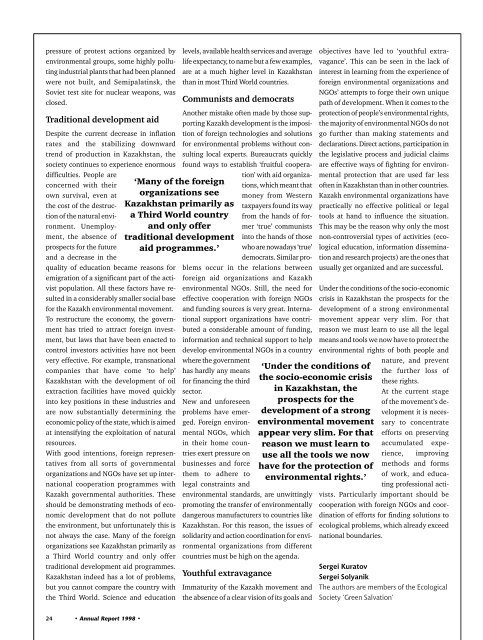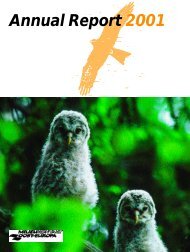Russia and Ukraine - Milieukontakt International
Russia and Ukraine - Milieukontakt International
Russia and Ukraine - Milieukontakt International
Create successful ePaper yourself
Turn your PDF publications into a flip-book with our unique Google optimized e-Paper software.
pressure of protest actions organized by<br />
environmental groups, some highly polluting<br />
industrial plants that had been planned<br />
were not built, <strong>and</strong> Semipalatinsk, the<br />
Soviet test site for nuclear weapons, was<br />
closed.<br />
Traditional development aid<br />
Despite the current decrease in inflation<br />
rates <strong>and</strong> the stabilizing downward<br />
trend of production in Kazakhstan, the<br />
society continues to experience enormous<br />
difficulties. People are<br />
concerned with their<br />
own survival, even at<br />
the cost of the destruction<br />
of the natural environment.Unemployment,<br />
the absence of<br />
prospects for the future<br />
<strong>and</strong> a decrease in the<br />
quality of education became reasons for<br />
emigration of a significant part of the activist<br />
population. All these factors have resulted<br />
in a considerably smaller social base<br />
for the Kazakh environmental movement.<br />
To restructure the economy, the government<br />
has tried to attract foreign investment,<br />
but laws that have been enacted to<br />
control investors activities have not been<br />
very effective. For example, transnational<br />
companies that have come ‘to help’<br />
Kazakhstan with the development of oil<br />
extraction facilities have moved quickly<br />
into key positions in these industries <strong>and</strong><br />
are now substantially determining the<br />
economic policy of the state, which is aimed<br />
at intensifying the exploitation of natural<br />
resources.<br />
With good intentions, foreign representatives<br />
from all sorts of governmental<br />
organizations <strong>and</strong> NGOs have set up international<br />
cooperation programmes with<br />
Kazakh governmental authorities. These<br />
should be demonstrating methods of economic<br />
development that do not pollute<br />
the environment, but unfortunately this is<br />
not always the case. Many of the foreign<br />
organizations see Kazakhstan primarily as<br />
a Third World country <strong>and</strong> only offer<br />
traditional development aid programmes.<br />
Kazakhstan indeed has a lot of problems,<br />
but you cannot compare the country with<br />
the Third World. Science <strong>and</strong> education<br />
24 • Annual Report 1998 •<br />
‘Many of the foreign<br />
organizations see<br />
Kazakhstan primarily as<br />
a Third World country<br />
<strong>and</strong> only offer<br />
traditional development<br />
aid programmes.’<br />
levels, available health services <strong>and</strong> average<br />
life expectancy, to name but a few examples,<br />
are at a much higher level in Kazakhstan<br />
than in most Third World countries.<br />
Communists <strong>and</strong> democrats<br />
Another mistake often made by those supporting<br />
Kazakh development is the imposition<br />
of foreign technologies <strong>and</strong> solutions<br />
for environmental problems without consulting<br />
local experts. Bureaucrats quickly<br />
found ways to establish ‘fruitful coopera-<br />
tion’ with aid organizations,<br />
which meant that<br />
money from Western<br />
taxpayers found its way<br />
from the h<strong>and</strong>s of former<br />
‘true’ communists<br />
into the h<strong>and</strong>s of those<br />
who are nowadays ‘true’<br />
democrats. Similar problems<br />
occur in the relations between<br />
foreign aid organizations <strong>and</strong> Kazakh<br />
environmental NGOs. Still, the need for<br />
effective cooperation with foreign NGOs<br />
<strong>and</strong> funding sources is very great. <strong>International</strong><br />
support organizations have contributed<br />
a considerable amount of funding,<br />
information <strong>and</strong> technical support to help<br />
develop environmental NGOs in a country<br />
where the government<br />
has hardly any means<br />
for financing the third<br />
sector.<br />
New <strong>and</strong> unforeseen<br />
problems have emerged.<br />
Foreign environmental<br />
NGOs, which<br />
in their home countries<br />
exert pressure on<br />
businesses <strong>and</strong> force<br />
them to adhere to<br />
legal constraints <strong>and</strong><br />
environmental st<strong>and</strong>ards, are unwittingly<br />
promoting the transfer of environmentally<br />
dangerous manufacturers to countries like<br />
Kazakhstan. For this reason, the issues of<br />
solidarity <strong>and</strong> action coordination for environmental<br />
organizations from different<br />
countries must be high on the agenda.<br />
Youthful extravagance<br />
Immaturity of the Kazakh movement <strong>and</strong><br />
the absence of a clear vision of its goals <strong>and</strong><br />
‘Under the conditions of<br />
the socio-economic crisis<br />
in Kazakhstan, the<br />
prospects for the<br />
development of a strong<br />
environmental movement<br />
appear very slim. For that<br />
reason we must learn to<br />
use all the tools we now<br />
have for the protection of<br />
environmental rights.’<br />
objectives have led to ‘youthful extravagance’.<br />
This can be seen in the lack of<br />
interest in learning from the experience of<br />
foreign environmental organizations <strong>and</strong><br />
NGOs’ attempts to forge their own unique<br />
path of development. When it comes to the<br />
protection of people’s environmental rights,<br />
the majority of environmental NGOs do not<br />
go further than making statements <strong>and</strong><br />
declarations. Direct actions, participation in<br />
the legislative process <strong>and</strong> judicial claims<br />
are effective ways of fighting for environmental<br />
protection that are used far less<br />
often in Kazakhstan than in other countries.<br />
Kazakh environmental organizations have<br />
practically no effective political or legal<br />
tools at h<strong>and</strong> to influence the situation.<br />
This may be the reason why only the most<br />
non-controversial types of activities (ecological<br />
education, information dissemination<br />
<strong>and</strong> research projects) are the ones that<br />
usually get organized <strong>and</strong> are successful.<br />
Under the conditions of the socio-economic<br />
crisis in Kazakhstan the prospects for the<br />
development of a strong environmental<br />
movement appear very slim. For that<br />
reason we must learn to use all the legal<br />
means <strong>and</strong> tools we now have to protect the<br />
environmental rights of both people <strong>and</strong><br />
nature, <strong>and</strong> prevent<br />
the further loss of<br />
these rights.<br />
At the current stage<br />
of the movement’s development<br />
it is necessary<br />
to concentrate<br />
efforts on preserving<br />
accumulated experience,<br />
improving<br />
methods <strong>and</strong> forms<br />
of work, <strong>and</strong> educating<br />
professional activists.<br />
Particularly important should be<br />
cooperation with foreign NGOs <strong>and</strong> coordination<br />
of efforts for finding solutions to<br />
ecological problems, which already exceed<br />
national boundaries.<br />
Sergei Kuratov<br />
Sergei Solyanik<br />
The authors are members of the Ecological<br />
Society ‘Green Salvation’





